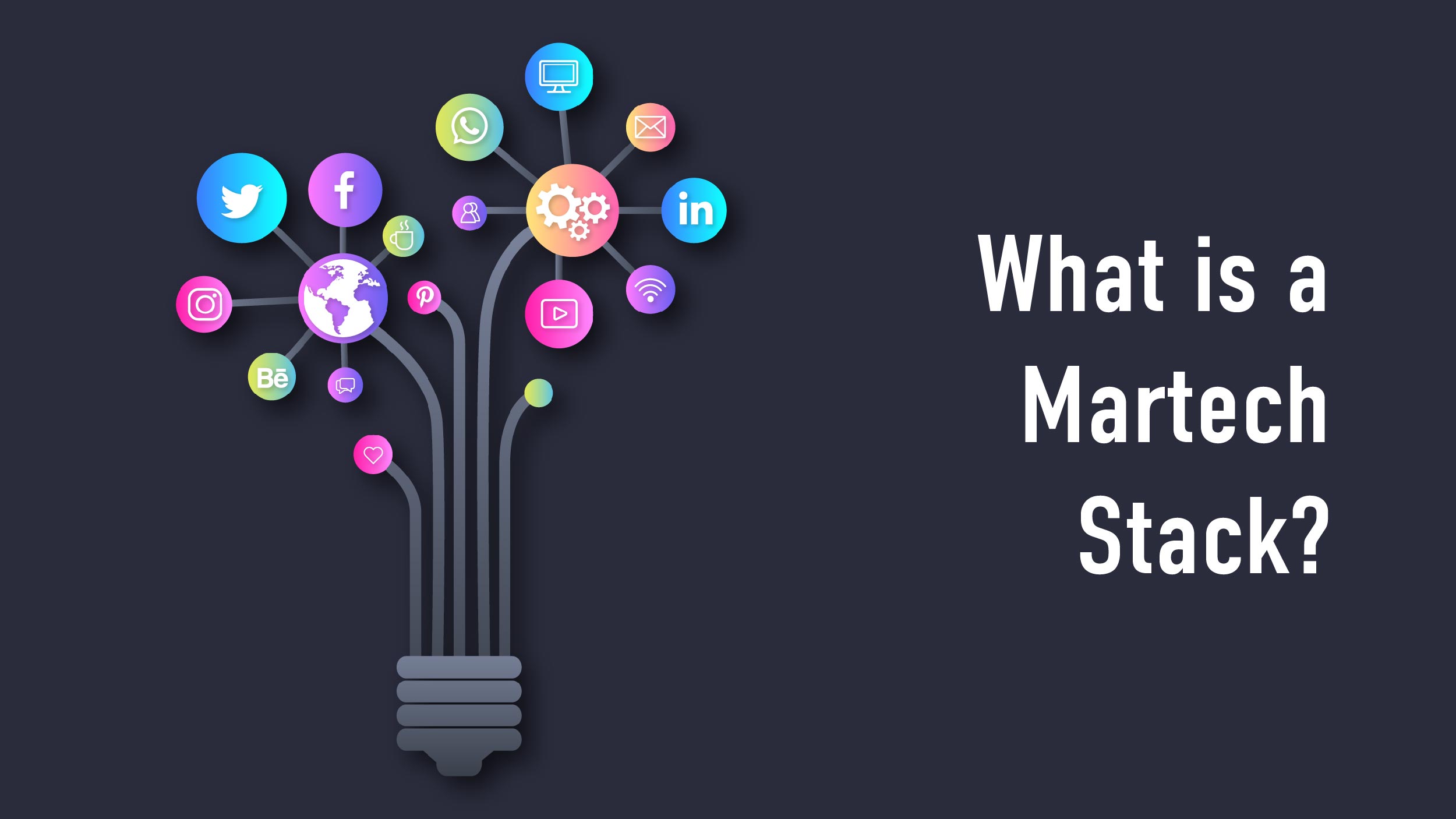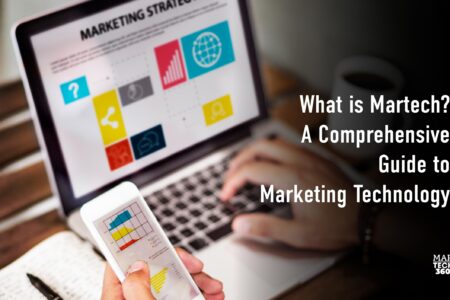Martech, aka marketing technology, is capturing massive attention. This buzzword hit 2,08,00,000 results on Google. The global marketing technology market reached a valuation of $670 billion in 2023. This encouraged marketers to spend a substantial amount of their budgets on marketing technology. This article sheds light on what is martech, why it is important and more.
What is Martech?
MarTech acts as a toolkit for marketers to enhance their marketing endeavors and achieve their objectives effectively. By utilizing technology, marketers can efficiently strategize, execute, and evaluate campaigns and diverse marketing tactics. Simply put, it simplifies the tasks of marketers. These tools play a pivotal role in optimizing marketing processes within a multi-touchpoint omnichannel environment.
What is a Martech Stack?

Types of Martech
Marketing technology helps businesses with various tasks. Four different types of marketing technology include: managing, optimizing social media, expanding campaign reach, and gaining insights.
Management
Management tools include content, vendors, products, budgets, and timelines. Using them well is key to your whole marketing plan. Effective systems let you quickly find and use materials. They provide smart suggestions and accurate reporting.
Social optimization
These tools aid social tactics like influencer and user-generated content management. They help connect with online communities efficiently by automating processes.
Campaign reach
Such marketing technology assists brand campaigns to reach wider audiences through remarketing. Leveraging these solutions cultivates lasting business relationships with other companies (B2B) and customers (B2C).
Insight generation
Analytics from sites like Amazon Attribution allow marketers to clearly see how their campaigns, marketing content, and social media are doing. This data category helps us understand complex information. The marketing technology tools you choose depend on your business type, product, needs, and goals. If your team can’t pick one, don’t worry! marketing technology “stacks” let you connect multiple solutions at once.
Uses of Martech
Here are some of the key uses:
- Streamlining Marketing Processes: It automates repetitive tasks such as email marketing campaigns, social media scheduling, and content management. This frees up marketers’ time to focus on more strategic initiatives.
- Personalization and Customer Experience: Marketing technology tools allow businesses to gather and analyze customer data. This data can then be used to personalize marketing messages, product recommendations, and overall customer experience across different touchpoints.
- Data-Driven Decision Making: It provides valuable insights into marketing campaign performance, customer behavior, and market trends. This data empowers marketers to make data-driven decisions and optimize their marketing strategies for better results.
- Content Marketing and Management: These platforms help create, manage, and distribute content across various channels. This includes content calendars, social media management tools, and content analytics for measuring content effectiveness.
- Improved ROI and Conversion Rates: By automating tasks, personalizing experiences, and making data-driven decisions, marketing technology helps businesses improve their return on investment (ROI) and conversion rates from marketing campaigns.
- Omnichannel Marketing: It facilitates omnichannel marketing by enabling consistent messaging and brand experience across all channels like email, social media, website, and mobile apps.
- Campaign Management and Measurement: Marketing technology tools help plan, execute, and measure the performance of marketing campaigns across different channels. This provides valuable insights for future campaign optimization.
Also Read: 5 Best Marketing Automation Tools In 2024
Benefits of Martech
Efficiency and Automation: Marketing technology tools streamline marketing processes, automating tasks like email marketing, social media management, and campaign tracking. This saves time and resources, allowing marketers to focus on strategic activities.
Data-Driven Insights: It provides access to valuable data and analytics, offering insights into customer behavior, preferences, and campaign performance. This data-driven approach helps businesses make informed decisions, optimize marketing strategies, and improve ROI.
Personalization and Targeting: It enables businesses to deliver personalized experiences to their target audience. Marketers can craft customized campaigns, content, and offers by utilizing customer data and segmentation, ensuring that they resonate with each customer. This leads to higher engagement and conversion rates.
Improved Customer Experience: It empowers businesses to enhance the customer journey by delivering relevant and timely content across multiple channels. Through automation and personalization, businesses can offer a seamless and tailored experience, boosting customer loyalty and satisfaction.
Integration and Collaboration: Marketing technology tools facilitate the integration of various marketing channels and platforms, ensuring a cohesive and synchronized marketing strategy. Enhanced collaboration between teams results in more efficient coordination and alignment of marketing efforts.
Cost Efficiency: Marketing technology optimizes marketing budgets by automating manual tasks, reducing resource requirements, and enhancing campaign effectiveness. This cost efficiency enables businesses to allocate resources strategically, achieving better results within their budget.
How does Martech Support Businesses?
Small businesses can level the playing field with marketing technology. These platforms are like all-in-one toolkits that automate tasks, analyze data, and manage projects, freeing you up for strategic thinking. Even small improvements can make a big difference!
The challenge? Marketing technology is constantly evolving, and some companies struggle to keep pace. The good news is, that user-friendly marketing technology platforms are booming, offering features like automation, data analysis, and easy contact management. These tools can also break down information silos within your company, allowing everyone to work together more effectively.
But the real power lies in personalization. By leveraging customer data, you can tailor your marketing messages to resonate with specific audiences. Research shows that 56 % of people prefer brands that understand them, and marketing technology can help you build those deeper connections, ultimately leading to more sales and happier customers.
Why is Martech Important?
Marketing technology solutions let you automate many digital marketing tasks. From creating and tasting assets to distributing and tracking them, these tools simplify the process. They allow you to examine the full customer journey through the marketing funnel. You can then spot missed opportunities and problems that reduce sales.
With these insights, you can optimize marketing efforts to boost engagement and conversions. Ultimately, marketing technology enables faster, smoother marketing execution and scalability while using fewer resources. However, as more tools emerge, system management and integration grow increasingly vital. For instance, an integrated marketing technology stack allows apps to share data through a unified record system.
Why are Businesses Investing in Martech?
More companies are putting money into marketing technology. There are many good reasons for this. First, it can help companies do better than others. It also improves how a business does overall. Additionally, marketing technology tools make marketing easier by automating tasks such as email, social media, and tracking campaigns. This frees up time for more important work.
It also gives data and stats on customers, offering insights into how people act, what they want, and if campaigns work. Using this data, we’ll help improve decisions, thereby making marketing better and increasing revenue. Plus, it lets companies tailor experiences by connecting with customers on a deeper level. This boosts involvement and sales conversions.
Another major reason for the adoption of marketing technology is better customer journeys. Content people want appears when they need it. This automation and customization build loyalty. Customers are happier overall with their experiences.
Final Takeaway
Marketing technology is now crucial for modern marketing approaches. Companies automating and personalizing with the right martech stack achieve valuable insights. Such personalization enhances customer experience, and optimization fully leverages marketing efforts. This cutting-edge application maintains a competitive edge, fueling growth and hitting milestones in our evolving digital world.

